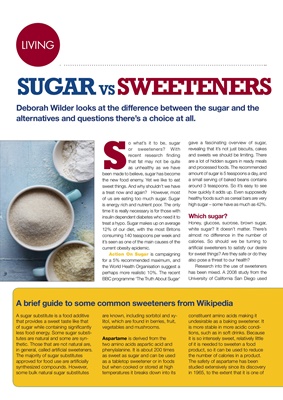
LIVINGLIVING
So what's it to be, sugar
or sweeteners? With
recent research finding
that fat may not be quite
as unhealthy as we have
been made to believe, sugar has become
the new food enemy. Yet we like to eat
sweet things. And why shouldn't we have
a treat now and again? However, most
of us are eating too much sugar. Sugar
is energy rich and nutrient poor. The only
time it is really necessary is for those with
insulin dependent diabetes who need it to
treat a hypo. Sugar makes up on average
12% of our diet, with the most Britons
consuming 140 teaspoons per week and
it's seen as one of the main causes of the
current obesity epidemic.
Action On Sugar is campaigning
for a 5% recommended maximum, and
the World Health Organisation suggest a
perhaps more realistic 10%. The recent
BBC programme 'The Truth About Sugar'
SUGAR VS SWEETENERS
Deborah Wilder looks at the difference between the sugar and the
alternatives and questions there's a choice at all.
gave a fascinating overview of sugar,
revealing that it's not just biscuits, cakes
and sweets we should be limiting. There
are a lot of hidden sugars in ready meals
and processed foods. The recommended
amount of sugar is 5 teaspoons a day, and
a small serving of baked beans contains
around 3 teaspoons. So it's easy to see
how quickly it adds up. Even supposedly
healthy foods such as cereal bars are very
high sugar - some have as much as 42%.
Which sugar?
Honey, glucose, sucrose, brown sugar,
white sugar? It doesn't matter. There's
almost no difference in the number of
calories. So should we be turning to
artificial sweeteners to satisfy our desire
for sweet things? Are they safe or do they
also pose a threat to our health?
Research into the use of sweeteners
has been mixed. A 2008 study from the
University of California San Diego used
A sugar substitute is a food additive
that provides a sweet taste like that
of sugar while containing significantly
less food energy. Some sugar substitutes are
natural and some are synthetic. Those that are
not natural are,
in general, called artificial sweeteners.
The majority of sugar substitutes
approved for food use are artificially
synthesized compounds. However,
some bulk natural sugar substitutes
are known, including sorbitol and xylitol, which are
found in berries, fruit,
vegetables and mushrooms.
Aspartame is derived from the
two amino acids aspartic acid and
phenylalanine. It is about 200 times
as sweet as sugar and can be used
as a tabletop sweetener or in foods
but when cooked or stored at high
temperatures it breaks down into its
constituent amino acids making it
undesirable as a baking sweetener. It
is more stable in more acidic conditions, such as in soft drinks. Because
it is so intensely sweet, relatively little
of it is needed to sweeten a food
product, so it can be used to reduce
the number of calories in a product.
The safety of aspartame has been
studied extensively since its discovery
in 1965, to the extent that it is one of
A brief guide to some common sweeteners from Wikipedia